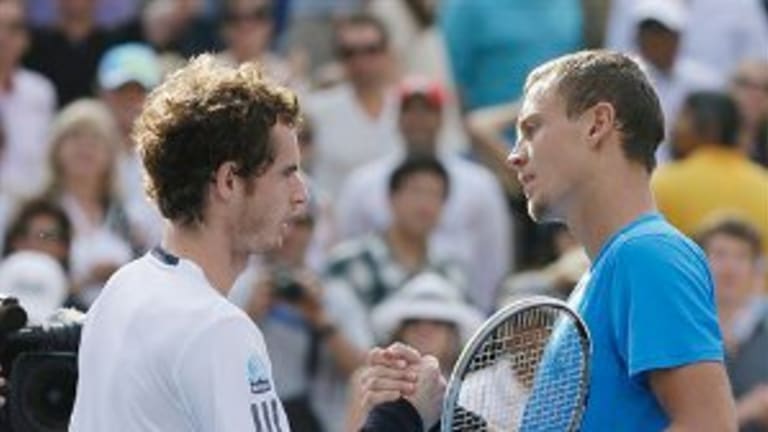NEW YORK—There’s been plenty of chatter and complaint about how the U.S. Open needs a roof to keep out the rain. On Saturday there was a new reason, or two new reasons, to lament having to play outdoors in New York’s tumultuous September weather: Two separate tornadoes tore through Queens over the course of the day.
There was just enough time in between them for Andy Murray and Tomas Berdych to complete their semifinal, but it wasn’t pretty, and it didn’t look like fun. The wind sent chairs flying across the court and pieces of plastic swirling through the air. It forced the players to lurch and lunge on virtually every shot, as if they were two pitchers sending knuckleballs across the net at each other. Play was stopped time and again by flying debris, as Murray and Berdych worked hard to keep their composure. If you’re looking for one word to describe this semifinal, it would probably be enervating.
When it was over, and Murray had won 5-7, 6-2, 6-1, 7-6 (7), he was asked if he had ever played in worse conditions. He immediately referenced the 2009 Indian Wells final, which he lost to Rafael Nadal. That day Nadal gave him a master class in how to use the breeze to your advantage. He sliced the ball low and short and snuck in to the net whenever he could. Murray, who was helpless that day, used some of the same tactics, to the same positive effect, Saturday afternoon. He cut under and around his backhand to make the ball tail away from Berdych, and he bunted his forehand low to force the tall man to bend. For the better part of three sets, Berdych’s power was rendered useless as he struggled to get his feet into position and put a clean swing on the ball.
None of which did much for Berdych’s mood. He wore a blank look of puzzlement for much of the match, and when a reporter’s cellphone went off in his press conference afterward, he shot him a look and said, “Done? Good.” Berdych said that there should be a rule that allows play to be suspended due to overly windy conditions.
“I mean, we are here in the States where they really love [a] show,” Berdych said. “Actually, this is not about show. This is just about somehow to try to deal with the conditions and then trying to put the ball over the net.”
Asked if officials had talked to him about not playing the match, Berdych said, “No. Nobody cares.”
Berdych admitted that he hadn’t handled the wind as well as Murray. “He dealt with it much better than I did,” the Czech said. Berdych had trouble controlling his service toss and said that it was tough for him to be aggressive and not make mistakes.
In the end, it wasn’t surprising that the more flexible and complete player adjusted to the wind better. Murray had more options, more spins, more ways to win a point. Most important, he made fewer errors—Murray committed 20, Berdych 64. Murray had a whopping 22 break points; he converted on just seven, but it was enough to get him across the finish line in four sets and a little under four hours. He was asked afterward if he enjoyed the experience.
“You can’t really allow yourself to enjoy it,” Murray said, giving voice to the type of point-by-point pressure both players felt today, “because anything can happen. The match can turn around so quickly.” Credit Murray for not letting it turn against him in the fourth set, when he went from having two break points for a 4-0 lead to being tied at 3-3 a few minutes later.
Now, the next step: Another Grand Slam final—his fifth—and another chance to get the biggest monkey in tennis off his back by winning his first. He couldn’t have drawn it up any better. First, Murray is coming off a win in the closest thing you can get to a major, the Olympics. Second, and most important, two of his usual tormentors in the latter stages of majors, Roger Federer and Rafael Nadal, are out of the tournament. And another of those tormentors, Novak Djokovic, is currently down 2-5 in the first set to David Ferrer. Even if Djokovic comes back to win, he’ll face the prospect of playing the final without a day of rest.
Murray says that his Olympic win should help him in the Open final, if only because it has “taken a bit of pressure” off of him—the home-country fans and press can’t knock him quite as hard now that he’s brought them a gold medal. He also said today that having lost in the final here in 2008 might help, because at least he’s had the experience of playing in that setting. Murray should be feeling confident in general; he has now made two straight Grand Slam finals, something he had never done before. “It’s been my best year,” he said today.
That confidence served him well today. Murray lost the first set and looked ready to lose his cool, as he has in Grand Slam semifinals in the past. Instead, he simplified his game, didn’t try to do too much in the wind, and relied on his biggest advantage over Berdych, his superior consistency.
But Murray also knows that, Olympic gold or not, there’s a lot at stake for him on Monday. An 0-5 record in Slam finals would obviously make the monkey bigger—even his coach, Ivan Lendl, only started 0-4 in them. And who knows when he'll get another chance to win one without facing Federer or Nadal.
If Murray was nervous about the moment, he wasn’t showing it saturday. “Do you feel like you can go on and win the tournament now?” he was asked.
Murray sat back and took a long breath. “That’s the plan,” he said.
